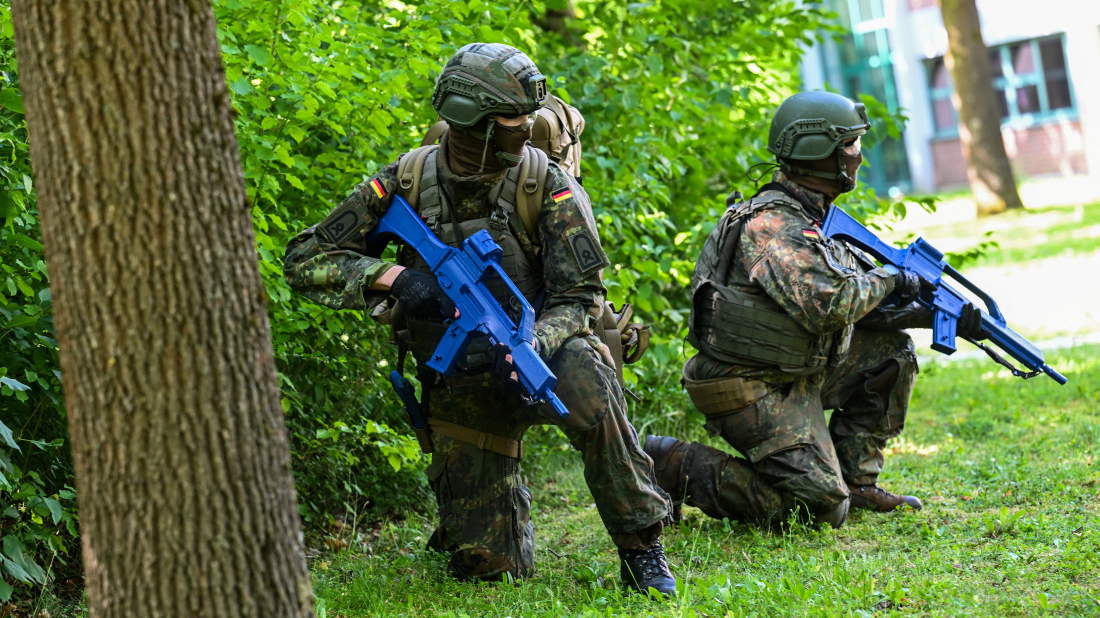Israeli airstrikes kill nine in Gaza, Palestinian officials report
At least nine Palestinians were killed in Israeli airstrikes in the northern and southern Gaza Strip on Sunday (15 February), Palestinian civil defenc...

Germany has seen a 28% surge in military enlistment this year, with over 13,700 new recruits, as the government prepares a new voluntary service law and weighs reintroducing national conscription by 2027.
A growing number of young people in Germany are joining the country's armed forces, according to a new report published by Der Spiegel on Tuesday.
Data released by the German Federal Ministry of Defence shows that 13,750 new recruits had joined the Bundeswehr — Germany’s federal armed forces — by 21 July, representing a 28% increase compared to the same period in 2024.
This uptick includes both fixed-term voluntary soldiers and young people entering the military through Germany’s voluntary military service programme. The latter allows a six-month probationary period before a long-term decision is made.
The total number of uniformed personnel in the Bundeswehr now stands at approximately 183,100 — about 2,000 more than a year ago. The number of participants in voluntary military service has also climbed by 15%, now reaching around 11,350.
Officials attribute the rise to focused media outreach and heightened awareness due to shifts in Europe’s security environment. “Germany’s changing security landscape and international responsibilities have made military preparedness a greater national priority,” the ministry said.
In response, the German cabinet is preparing to vote on a new defence law proposed by Defence Minister Boris Pistorius. The law, expected to be decided at the end of August, would launch a revised military service model in 2026. It would remain voluntary but include improved pay and more appealing service conditions to draw in up to 15,000 new conscripts per year.
Under the planned system, a mandatory pre-service assessment is due to be introduced in 2027 — a step that could pave the way for a broader reactivation of national service, more than a decade after Germany suspended conscription in 2011.
A new poll by the Forsa Institute conducted on 28 to 29 July highlights changing attitudes toward defence. According to the survey, 61% of Germans support reinstating mandatory service if voluntary enlistment proves inadequate.
However, enthusiasm to serve remains low: just 16% of respondents said they would definitely be willing to take up arms in defence of Germany if attacked. Among younger Germans aged 18 to 29, 61% were opposed to the idea of conscription.
Germany suspended compulsory military service in 2011 amid broader NATO downsizing, but recent geopolitical developments — including the ongoing conflict in Ukraine and rising global instability — have reignited debate over national defence capabilities.
The Defence Ministry's recruitment push comes amid broader efforts to revitalise the Bundeswehr, following longstanding criticism over equipment shortages and military readiness.
U.S. Ambassador to NATO Matthew Whitaker said China has the power to bring an end to Russia’s war in Ukraine, arguing that Beijing is enabling Moscow’s military campaign.
American figure skating star Ilia Malinin endured a dramatic collapse in the men’s free skate on Friday night, falling twice and tumbling out of medal contention at the Milan Cortina Winter Olympics as Kazakhstan’s Mikhail Shaidorov surged to a surprise gold medal.
“Respected and feared globally,” U.S. President Donald Trump told troops at Fort Bragg on Friday (13 February), framing America’s renewed strength against to mounting pressure on Iran amid stalled nuclear talks.
Dubai-based global ports operator DP World said on Friday that its long-serving chairman and chief executive, Sultan Ahmed Bin Sulayem, has stepped down following mounting pressure linked to alleged ties to disgraced financier Jeffrey Epstein.
Speaking at Munich Security Conference, Ukrainian foreign minister Andrii Sybiha calls for decisive steps ahead of expected Geneva talks
U.S. Secretary of State Marco Rubio will begin a two-day visit to Slovakia and Hungary on Sunday (15 February), aimed at strengthening ties with the two Central European nations, whose leaders have maintained close relations with President Donald Trump.
The Munich Security Conference concludes on Sunday (15 February) with discussions centred on Europe’s role in an increasingly unstable global landscape, including security coordination, economic competitiveness and the protection of democratic values.
Start your day informed with AnewZ Morning Brief: here are the top news stories for the 15th of February, covering the latest developments you need to know.
Australia will spend A$3.9bn to build a new shipyard for AUKUS nuclear-powered submarines, Prime Minister Anthony Albanese has announced, marking a major step in the trilateral defence pact with the U.S. and Britain.
Britain, France, Germany, Sweden and the Netherlands said on Saturday (14 February) they are convinced that late Kremlin critic Alexei Navalny was poisoned with a lethal toxin in a Russian penal colony two years ago.
You can download the AnewZ application from Play Store and the App Store.

What is your opinion on this topic?
Leave the first comment